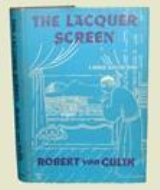
The Lacquer Screen
Encyclopedia
The Lacquer Screen is a detective novel written by Robert van Gulik
and set in Imperial China
(roughly speaking the Tang Dynasty
). It is a fiction based on the real character of Judge Dee
(Ti Jen-chieh or Di Renjie), a magistrate
and statesman
of the Tang
court, who lived roughly 630
–700
.
The book features fourteen illustrations by the author.
The town of Peng-lai was the setting for other Judge Dee stories including: The Chinese Gold Murders
, and three of the short stories from Judge Dee at Work
.
Robert van Gulik
Robert Hans van Gulik was a highly educated orientalist, diplomat, musician , and writer, best known for the Judge Dee mysteries, the protagonist of which he borrowed from the 18th-century Chinese detective novel Dee Goong An.-Life:Robert van Gulik was the son of a medical officer in the Dutch...
and set in Imperial China
Mid-Imperial China
Mid-Imperial China begins with the reunification of China by the short-lived Sui dynasty in 589. The Sui replaced the nine-rank system with the imperial examination and embarked on major public works such as connecting the various canals to form the Grand Canal...
(roughly speaking the Tang Dynasty
Tang Dynasty
The Tang Dynasty was an imperial dynasty of China preceded by the Sui Dynasty and followed by the Five Dynasties and Ten Kingdoms Period. It was founded by the Li family, who seized power during the decline and collapse of the Sui Empire...
). It is a fiction based on the real character of Judge Dee
Judge Dee
Judge Dee is a semi-fictional character based on the historical figure Di Renjie , magistrate and statesman of the Tang court. The character first appeared in the 18th century Chinese detective novel Di Gong An...
(Ti Jen-chieh or Di Renjie), a magistrate
Magistrate
A magistrate is an officer of the state; in modern usage the term usually refers to a judge or prosecutor. This was not always the case; in ancient Rome, a magistratus was one of the highest government officers and possessed both judicial and executive powers. Today, in common law systems, a...
and statesman
Statesman
A statesman is usually a politician or other notable public figure who has had a long and respected career in politics or government at the national and international level. As a term of respect, it is usually left to supporters or commentators to use the term...
of the Tang
Tang Dynasty
The Tang Dynasty was an imperial dynasty of China preceded by the Sui Dynasty and followed by the Five Dynasties and Ten Kingdoms Period. It was founded by the Li family, who seized power during the decline and collapse of the Sui Empire...
court, who lived roughly 630
630
Year 630 was a common year starting on Monday of the Julian calendar. The denomination 630 for this year has been used since the early medieval period, when the Anno Domini calendar era became the prevalent method in Europe for naming years.- Byzantine Empire :* Croats and Serbs settle in the...
–700
700
Year 700 was a leap year starting on Thursday of the Julian calendar. The denomination 700 for this year has been used since the early medieval period, when the Anno Domini calendar era became the prevalent method in Europe for naming years.- North America :* The Mount Edziza volcanic complex...
.
The book features fourteen illustrations by the author.
Plot introduction
In 663, Judge Dee is the young magistrate in the fictional town of Peng-lai. On a visit to a senior magistrate he is shown a beautiful lacquer screen which is mysteriously altered to show a murder scene instead of a love scene. With the senior magistrate convinced he is going insane, a wealthy banker in town does kill himself, or is it murder? Judge Dee and his faithful servant Chiao Tai go undercover and join a gang of robbers to solve the case.The town of Peng-lai was the setting for other Judge Dee stories including: The Chinese Gold Murders
The Chinese Gold Murders
The Chinese Gold Murders is a detective novel written by Robert van Gulik and set in Imperial China . It is a fiction based on the real character of Judge Dee , a magistrate and statesman of the Tang court, who lived roughly 630–700.The book includes a map of the fictional town of...
, and three of the short stories from Judge Dee at Work
Judge Dee at Work
Judge Dee at Work is a collection of detective short stories written by Robert van Gulik and set in Imperial China...
.

